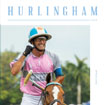April 25, 2009
USPA Establishes Committee to Examine Additional Safeguards for Polo Horses
Wellington, FL – During its semi-annual Board of Governors meeting today, the United States Polo Association (USPA) voted to establish a committee to examine existing and additional safeguards for polo horses including developing a prohibited substance policy.
The USPA’s Board of Governors approved the following motion:
“In light of the tragedy that occurred this past week, the USPA Equine Welfare Committee requests that the USPA Chairman establish a research committee to (i) review the forthcoming results from the civil authorities conducting the formal investigation and (ii) develop appropriate policies that will ensure the safety and well-being of polo horses.”
“The USPA has a tradition of promoting equine safety. The Board of Governors today approved the establishment of a review committee to examine equine safety issues in polo, including veterinarians, players, owners and polo leaders. The committee will examine the practices and policies of other equestrian organizations, as well as examine existing protections for horses and possible improvements including the establishment of a prohibited substance policy,” said Peter Rizzo, executive director of the USPA.
“We need to look after the best interests of the horses. Ultimately, what we do best for the horses will be best for polo and the United States Polo Association,” said Adam Snow, a world-class U.S. polo player and former 10-goaler who will be participating in the finals of the U.S. Open Championship on Sunday.
For over sixteen years, the USPA has maintained an Equine Welfare Committee whose major goal is to ensure the welfare, safety and protection of horses. The committee focuses on the rules of polo in an effort to make the game as safe as possible for the horses. The USPA is 100% committed to preventing a tragedy of this nature from happening in the future.
The USPA has been organized and exists for the purposes of promoting the game of polo, coordinating the activities of its Member Clubs and Registered Players, arranging and supervising polo tournaments, competitions, and games and providing rules, handicaps, and conditions for those tournaments, competitions, and games including the safety and welfare of participants and mounts.


